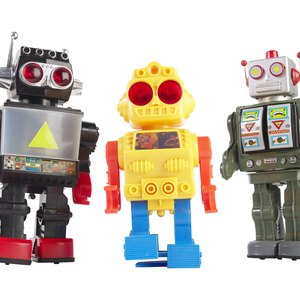
Going on a spending spree at the toy store for your own children might get you lots of “I love yous" – but it won’t get you any tax deductions from Uncle Sam. If you’re giving away toys to charity, on the other hand, the money you spend could add up and reduce your income tax burden. If you are ready to donate toys, tax deduction opportunities will be available to you!
Tips
If you are donating toys to a charity for the holidays, you may be able to deduct these expenses on your tax return. However, in order to do so you must qualify to list itemized deductions, meaning your deduction limit is already over the standard deduction amount.
Claiming Qualified Charities
Only toys given to charities recognized by the Internal Revenue Service count toward a tax deduction. For example, donating toys to the United Way’s annual toy drive gets you a write-off. However, giving them to your friend who then distributes them to needy children in the neighborhood won’t work unless he’s registered his group as a charity. To check, you can use the online Search for Charities on the IRS website. In addition, you’re never allowed a deduction for giving toys to specific people. For example, if a single mom with five kids who can’t afford any Christmas presents lives down the street from you, giving her toys or money to buy toys for her kids won’t get you a tax deduction.
Deducting the Value of Toys
Your deduction for donated toys equals the fair market value – what a willing buyer would pay a willing seller – of the items. You can determine this using a toy donation value guide. TIf you’re donating something new, you can use the price you paid for it. However, used toys, like any other used item, are usually worth significantly less than the original price. The IRS doesn’t price items specifically, so you may want to use prices for similar items at thrift stores or online to determine the value of used toys. You cannot claim a deduction based on the difference between what the toy was worth when purchased and its current fair market value.
If a toy has actually increased in value, in that it is rare or collectible, your basis for tax purposes is still generally what you paid for it. If it is an extremely valuable item, you will need the opinion of an expert in the field who appraises the toy for tax purposes. Such truly valuable toys fall under the IRS regulations applicable to "Paintings, Antiques and Other Objects of Art."
Filing Your Receipts and Deductions
If you didn’t get a receipt for your toy donation, you’re usually out of luck when it comes to claiming a deduction. The IRS is very adamant about assessing the value of donated toys for tax purposes. The only exception the IRS makes is for donations of less than $250 when getting a receipt simply isn’t practical, such as if you left the toys at an unattended drop box for a specific charity. Otherwise, you need a receipt that shows the name of the charity, when you donated it, where you donated and a general description of the toys you donated. If you donated between $250 and $500, as of the 2017 tax year, your receipt needs to give a specific list of the toys donated and whether you received anything in return for the contribution.
Like cash donations, the deduction for giving toys to charity is an itemized deduction you report on Schedule A. To take it, you must pass on the standard deduction for the year. If you don’t have much in the way of other itemized deductions, unless you’re donating some pretty fancy toys, it won’t be worth it. But, if you have other substantial donations or other itemized deductions like the interest on your home mortgage, tacking on your toy donations can mean a few extra bucks off your tax bill.
References
- Internal Revenue Service: Publication 526: Charitable Contributions
- IRS: Schedule A
- USA Today. "Toys R Us timeline: History of the nation's top toy chain." Accessed May 8, 2020.
- CNN Money. "Group to buy Toys 'R' Us for $6.6B." Accessed May 8, 2020.
- CNBC. "Toys R Us files for Chapter 11 bankruptcy protection." Accessed May 8, 2020.
- Reuters. "Toys 'R' Us plans to close all U.S. stores; 33,000 jobs at risk: source." Accessed May 8, 2020.
- CNBC. "Toys R Us tries for a comeback a year after going out of business." Accessed May 8, 2020.
- Tru Kids Brands. "Toys 'R' Us opens the doors to its first new U.S. store." Accessed May 8, 2020.
- CNBC. "Toys R Us stores closed on Friday, leaving behind nostalgia, anger and maybe a chance of revival." Accessed May 8, 2020.
- MarketWatch. "Toys 'R' Us to raise $800 million in biggest U.S. IPO this year." Accessed May 8, 2020.
- Reuters. "Toys R Us withdraws proposed initial public offering." Accessed May 8, 2020.
- Forbes. "Toys 'R' Us Hires New CEO With A Rich IPO Resume In David Brandon." Accessed May 8, 2020.
- Fortune. "Toys ‘R’ Us Is Closing 180 U.S. Stores After Declaring Bankruptcy." Accessed May 8, 2020.
- MGA Entertainment. "Isaac Larian Puts in Official Bid to Save Toys 'R' Us." Accessed May 8, 2020.
- CNN Business. "Bratz maker gives up on Toys 'R' Us." Accessed May 8, 2020.
- North Jersey. "Toys R Us opens 'new' kind of store, with its first US location in Garden State Plaza." Accessed May 8, 2020.
- Tru Kids Brands. "Target to Power Toys 'R' Us Shopping Experience." Accessed May 8, 2020.
Writer Bio
Based in the Kansas City area, Mike specializes in personal finance and business topics. He has been writing since 2009 and has been published by "Quicken," "TurboTax," and "The Motley Fool."

